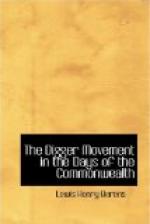Cromwell, in short, had no deep-rooted objection either to a moderate Episcopacy or to a tolerant Presbyterianism, though, as he somewhere says, “both are a hard choice,” provided only there was sufficient consideration for those who could not reconcile their consciences to the demands of the established State Church. His great desire was “for union and right understanding” between Protestants of all shades, in fact between “godley” (religious or moral) people of all races, countries and denominations, “Scots, English, Jews, Gentiles, Presbyterians, Independents, Anabaptists, and all.” (See his letter to Hammond, Clarke Papers, vol. ii. p. 49.) His aim was to reconcile, or rather to stand as mediator between all the opposing sects. “Fain,” he writes to one of his most devoted adherent (see Cromwell’s Letters and Speeches, Carlyle, part vii. p. 363), “would I have my service accepted of the Saints, if the Lord will;—but it is not so. Being of different judgements, and those of each sort seeking most to propagate their own, that spirit of kindness that is to them all is hardly accepted of any. I hope I can say it, My life has been a willing sacrifice,—and I hope—for them all. Yet it much falls out as when the two Hebrews were rebuked: you know upon whom they turned their displeasure.”
In short, Cromwell’s attitude toward all honest, sincere, “godley” men was the same as his attitude toward George Fox. “Come again to my house,” he said, when dismissing the sturdy Quaker, “for if thou and I were but an hour a day together we should be nearer one to the other. I wish you no more ill than I do to my own soul.”
On November 17th, 1645, “the Dissenting Bretheren,” the representatives of the Independents in the Westminster Assembly, declared for a full liberty of conscience. “They expressed themselves,” as Baillie, the Scotch Presbyterian commissioner, wrote sadly, “for toleration, not only to themselves, but to all sects.” In February of the same year, the Oxford Clergy, who had been consulted by the King as to the limits of possible concession, gave strong evidence that the pressure of events were forcing them to move, even though slowly, in the same direction. (See Gardiner, History of the Civil War, vol. ii. pp. 125-126.)
APPENDIX C
WHAT MAY BE THOSE PARTICULAR LAWS, OR SUCH A METHOD OF LAWS, WHEREBY A COMMONWEALTH MAY BE GOVERNED?
1. The bare letter of the Law established by Act of Parliament shall be the Rule for Officers and People, and the chief Judge of all actions.
2. He or they who add or diminish from the Law, excepting in the Court of Parliament, shall be cashiered his Office, and never bear Office more.
3. No man shall administer the Law for Money or Reward. He that doth shall die as a Traitor to the Commonwealth. For when Money must buy and sell Justice, and bear all the sway, there is nothing but Oppression to be expected.




